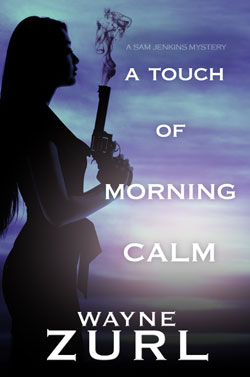Jan 10, 2016 by Wayne Zurl
This piece was destined for a contest that required everyone to begin their story with the line, “Have we met before?” I got that far, but drastically exceeded the word limit. So here we are. I gave the detective/hero of this saga the name Ian MacDonald because I wanted it ending with him getting the girl. And it would have been inappropriate for the long time married Sam Jenkins to do that.
A Too Perfect Crime
By Wayne Zurl
2011
I stood in front of her desk holding a gold badge in my hand. She looked on the shy side of fifty and quite beautiful. Instead of delivering my usual line, “Detective MacDonald, county police,” like an idiot I said, “Have we met before?”
She took off a pair of half lens reading glasses, tossed them on her desk, and laughed—one of the sexiest things I’d heard in a long time.
Always the professional, it took me only a moment of feeling like a putz before I replied. “I guess that sounded foolish. Or just the worst line you’ve heard all week.”
Her smile lingered, like a fixed beacon in a dark channel.
“Probably both,” she said, “but you didn’t need the badge for either.”
It was my turn to laugh. “You’re right. I know I keep that thing in my pocket for a reason. Let me start over. Hi, I’m Ian MacDonald, 5th Squad Detectives. I understand you had a burglary last night.”
From somewhere in the office, a Connecticut FM station played soft elevator music.
“Yes, we did.” Her face looked full of mischief; strawberry blonde hair, gray-green eyes, and a smile big enough to make me forget why I was standing there.
“Then, madam,” I bowed my head an inch, “I am your humble and obedient servant. Show me what happened and I’ll bring the culprit to justice quicker than you can say Andy Sipowicz.”
“Who?”
“Never mind. Let’s start with how they got in.”
As I followed her to the back of the real estate office, I noticed she’d been packaged by someone who knew his business—and deserved an award for his creation. A woman half her age would have been proud of the figure covered by a pastel green wraparound dress.
We checked out a broken double-hung window at the end of a hallway and I asked, “Is the place alarmed?”
“No, there’s really nothing here to steal.”
“Did they take anything?”
She shook her head. “Not that I can tell. But they ransacked all three desks and tried to break into the safe.”
“Aha!”
“Aha?”
“It’s what detectives say when ‘The game’s afoot,’ is inappropriate.”
She offered another smile, one worth seven figures. “Are you sure you’re a detective?”
“Oh, yeah. Wanna see my W-2 form?”
“No, I believe you.”
“Good, let’s look at the safe.”
“It’s in Ron’s office, but he’s out with a client.”
“Who’s Ron?”
“Ron Saperstein, the broker. He owns the agency.”
“You’re not a broker?”
“I’m an agent.”
“What’s the difference?” I knew, but I asked anyway, just to hear her talk.
“He’s the boss with the license. I’m a worker on commission.”
I nodded. “What did you say your name was?”
She chuckled. “I didn’t. And you haven’t asked yet. I’m Maggie Bain.”
I listened to the radio again. Paul Mauriat and his orchestra began playing Love is Blue. I was only a kid when that song became popular. I fell in love easily then, too.
“Bain sounds Scottish,” I said.
“So it does, Mr. MacDonald.”
I spent another fifteen seconds staring at her like the village idiot. Then we stepped into Saperstein’s office and looked at a wall safe.
“Who do you think broke into your office, Ms. Bain?”
She shrugged a pair of lovely shoulders. “I have no idea.”
The safe was a recessed affair, hidden from view by an eighteen-by-twenty-four framed photo of the Montauk Lighthouse, hinged and able to swing to the left. Around the top and right side of the safe, the sheetrock had been broken and pulled away by, I guessed, a claw hammer. The door of the safe looked untouched.
I used my cell phone to call the dispatcher. “This is MacDonald, 5th Squad. Send a crime scene unit to South Country Realty, CC number for reference is 10-503,349.”
“You got it, detective,” he said. “Should be there within a half hour.” I closed my phone.
“Do you keep cash in the safe?” I asked Maggie.
“No, we’re not a cash business. Any checks we get go into the escrow account each night.”
“What’s in the safe?”
“Contracts, other documents. It’s more for fire protection than theft.”
“Can you open it?”
“Sure.”
“Go ahead, I won’t peek.” I handed her a pair of latex gloves.
She laughed again and shook her head, but began spinning the dial.
As she entered the combination to the safe, I watched a green bottle fly buzz around the room. I took a swing at it with my clipboard and chased it out the door and into the hallway. When I heard her twist the handle and the lock bolt clicked home, I turned to look at Maggie. She extended a hand toward the partially open safe door.
“I won’t know what I’m looking at,” I said. “See if anything’s missing.”
She pushed the door further to the right, pulled a short stack of legal-looking documents from the safe, and thumbed through them.
“As far as I can tell, nothing’s been disturbed.”
“Sounds about right.”
A few lines of shallow furrows crossed her brow. “What do you mean?”
“Look at how the desk drawers are pulled out. They’re all extended. Nothing’s pushed back in. The sign of a good burglar. Pushing a drawer back takes valuable time.”
“A good burglar?”
“Figure of speech. But a competent burglar, an adult, wouldn’t break into a real estate office. Too much risk for too little return. Even kids wouldn’t waste their time. If they did, they’d vandalize the place.”
“Really?”
“Trust me. I know what I’m talking about.”
She dropped the stack of papers on Saperstein’s desk and rested her hands on her hips. “Okay, but who trusts someone who says, ‘Trust me’?”
I thought she looked incredibly sexy.
“I’m shattered.”
She winked. “You don’t even look ruffled.”
Maggie was a cool customer.
“If you sit out there,” I poked my thumb in the direction of her desk, “and Ron uses this office, who sits at desk number three?”
“Her name’s Carol Saccio. She’s off today.”
“Does Carol have any big problems you know about?”
“I don’t think so. She’s been married for years, has no kids. No, I’ve never heard her mention anything.”
“How about Ron? Any family problems? Law suits? Gambling, drugs, or alcohol issues?
“No, to all of those.”
“Then who’s left?”
“What do you mean?” She wrinkled her forehead again and looked concerned.
“Watch now while I do my impersonation of Sherlock Holmes.”
Maggie rolled her eyes and made a face.
“You’ve been divorced less than thirty days.”
“How did . . .?”
“Pretty good, huh?”
She nodded. “How did you know?”
“It’s July and you have a wide white band around your left ring finger where the sun hasn’t tanned your skin yet. The ring you’re wearing has a narrow band.”
“Aren’t you so clever?”
“Yes, I am thanks. And modest, too. You dumped husband number two?”
“Number three.”
“Close enough.”
“I guess.”
The green fly reentered the office through the open door. I took a second swing and missed, but it flew into the hall again. Maggie paid no attention.
“You once told him you keep an extra set of house keys in your desk?” I said.
“Yes, how do you . . .?”
I held up a hand to stop her question. “Elementary, my dear woman.”
An old cottage clock in Ron’s office chimed eleven times. I know my antiques; it was worth at least four hundred bucks. No self-respecting burglar would have left without it.
I dropped the clipboard on the desktop, sat in the boss’s burgundy leather swivel chair, and did a quick three-sixty. It felt comfortable and smelled like the interior of an old English sports car. Saperstein had exquisite taste, but probably paid too much for the chair.
Maggie dropped into an armless side chair next to the expansive desk. “Oh, stop,” she said.
I smiled. “Okay, but just one or two more questions.”
“Sure, but you’re doing just fine without my help.”
I used my shy little boy smile to make her think she flattered me.
“Did you get to keep an expensive engagement ring?”
“No, I gave it back to him.”
“Very classy. I approve.”
She smiled this time.
“Any kids?” I asked.
“No.”
“How about a dog or cat?”
“A dog.”
“Good. I like dogs. What kind?”
“A West Highland terrier.”
“How appropriate. Is Bain your ex-husband’s name?”
“No, it’s my maiden name. He’s Stanley Lewandowski.”
I shook my head. “I’d keep Bain, too.”
She smiled again.
“Before you became a real estate agent, were you either a nurse or a waitress?”
“I used to wait tables at the Harborside.”
I touched my forehead with two fingers and closed my eyes. “I’m looking into my crystal ball and see a man in uniform, a blue uniform. Am I close?”
“On the nose.”
“Your ex is a cop?”
“He is. A desk sergeant in Coney Island.”
“Six-oh precinct?”
“Uh-huh.”
“Wanna bet he’s off today?”
“No bet, Sherlock. How’d you know?”
“The burglar wanted something in one desk. Searching the others and the damage around the safe is just a smoke screen. A cop would be that smart. He’d know how a burglar works. Your ex would know there was no alarm and about your keys because you told him. Was the dog mentioned in the divorce settlement?”
“No.”
“And your ex loves the dog?”
“He did.”
“Aha!”
“Aha again?”
“Sure. I’ll give you five to one you’ve been dog-knapped.”
“That bastard!”
“Sorry. Let’s make sure your keys are gone.”
I followed her into the outer office.
On the way, Maggie turned her head to speak. “He’ll pay for this.”
“Yeah, he probably will—more than you know.”
She rummaged around in her top desk drawer for a long moment, slammed it, and shook her head. “I have to go home and look for my dog.”
“Let’s get Ron back here first. He can watch the store, call someone to board up the window, and contact his insurance company.”
She nodded and tapped a number into the phone.
As she spoke into the receiver, a crime scene technician named Thomas walked into the office.
“Whaddaya say, Paul?”
He stood there holding a camera bag and forensics kit. “Hey, Ian, what’s up?”
I told him and pointed in the right direction. “See if you can locate a claw hammer or something that could have been used to break out the sheetrock. It might not be far off. I don’t think the burglar came here fully equipped.”
He nodded and headed for Saperstein’s office.
Forty-five minutes later, Maggie Bain and I stood in the living room of a neat little clapboard cottage on Fireplace Neck Road in Brookhaven. All the rooms were furnished Early American style. We found the back door ajar and her dog conspicuously absent.
“That bastard!” she said.
“You have his new address handy?”
She gave it to me.
“Stanley screwed up by breaking into Ron’s office,” I said. “Too much damage to a third party’s property to keep this quite. An insurance company is involved and he committed a couple felonies. That’s not good. Does Stanley have his twenty years in yet?”
“Twenty-six.”
“Then we have something in common.”
“What’s that?” She sounded surprised.
“I’ve also been a cop for twenty-six years and I’m attracted to his ex-wife.”
“Really?”
I nodded. “Yeah. Maybe Stanley can work a deal to retire and fade into the sunset.”
“The bastard should go to jail.”
“Jail is no place for a cop.”
“Who’s side are you on?”
“Yours. Does he pay you alimony?”
“Not much.”
“You’ll get even less cash if he goes in the slammer.”
“I see your point.”
I shrugged. “I’ll get your dog back for you.”
She pouted for a second. “Thanks.”
“What’s the dog’s name?”
“Lily.”
“Wow, Maggie and Lily. That’s nice. Did I mention I like dogs?”
She looked into my eyes and I watched the anger of a moment ago fade. Then she smiled. “I’m glad you were the detective they sent, Mr. MacDonald.”
“It’s Ian, Ms. Bain.”
“Maggie, Ian.”
“Mind if I go easy on Stanley?”
She frowned again.
“He’ll pay for what he did,” I said.
“What do you think will happen to him?”
“If he gets a good lawyer, three years probation and they’ll allow him to keep his pension. I have to make an arrest, but I don’t have to eviscerate him.”
“I just want Lily back,” she said.
“Lily I can get.”
“Thank you.” She fluttered a pair of long lashes.
A hint of pale orange lipstick complimented her hair and eyes.
I looked at my watch. “It’s long after noon. I’ll find Stanley later. Would you like lunch?”
She tilted her head seductively. “Yes, Ian, I’d love to have lunch with you.”
“Good. How about a drink first?”
“You drink on duty?”
“Only when it’s appropriate.”
“Okay, a glass of wine would be nice.”
She locked the house and as we walked down the driveway toward my car, Maggie slid her hand under my arm. Her blonde hair glistened in the sun’s backlighting.
“Primo’s Gym,” I said.
“What about Primo’s?”
“I just remembered. That’s where I’ve seen you.”
“You have?”
“Sure, who could forget that spandex you wear?”
She blushed a little.
“Have we actually met?” She sounded embarrassed.
“No, but I’ve been on the treadmill behind you a couple times.”
“Really?”
“Yeah. Better than watching the TV.”
She gave my shoulder a soft punch.
“I guess you’re not shy, are you?” she said.
“You’re beautiful, and it helps to be honest.”
“I hope you’re not married, Ian.”
“No, ma’am, not lately.”
She kissed me on the cheek.
“Bring back Lily and I’ll have a nice surprise for you.”
“Gee, I’m wasting my time as a cop. I should have been a dog warden.”
“Dog wardens don’t investigate burglaries, do they?”
“You’ve got a point. You like the Carman’s River Inn?”
“Love it.”
The End
read more

 Chief Sam Jenkins runs headlong into Tennessee’s faction of Korean organized crime when a mobster tries to shake down two former call girls attempting to establish a legitimate business. Soon, bodies begin piling up—all with a Korean connection—in Sam’s town of Prospect and nearby Knoxville.
Chief Sam Jenkins runs headlong into Tennessee’s faction of Korean organized crime when a mobster tries to shake down two former call girls attempting to establish a legitimate business. Soon, bodies begin piling up—all with a Korean connection—in Sam’s town of Prospect and nearby Knoxville.









